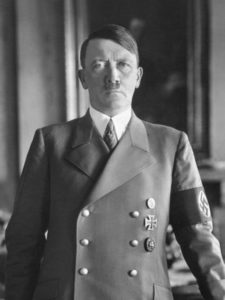
Bundesarchiv, Bild 183-H1216-0500-002 / CC-BY-SA [CC BY-SA 3.0 de (https://creativecommons.org/licenses/by-sa/3.0/de/deed.en)], via Wikimedia Commons
At the same time, Hitler himself turned to a quack doctor, who not only injected him with an odd array of hormonal and vitamin supplements, but also with an increasing panoply of hard drugs. The book is based on extensive archival research, which allows Ohler to describe the bewildering array of Hitler’s medications. The book brilliantly captures the toxic atmosphere of Hitler’s entourage, as their leader became increasingly isolated physically and psychologically.
Hitler’s physician, Dr. Theo Morell, was a fascinating figure, who used his ties to Hitler to build a pharmaceutical empire, which was based on organs from the slaughterhouses of conquered territories in the East. At a time when every transport was needed to carry ammunition and wounded soldiers, he finagled trucks and trains to carry organs from the Ukraine to his plant in what is now the Czech Republic. With time, as Hitler’s physical condition declined, his activities drew the attention of not only Hitler’s entourage but also doctors, who believed that Morell was threatening Hitler’s health. The ensuing clash ended in Morell’s victory, based on Hitler’s personal backing.
This was a hard book to read because of the disturbing details, from the drug testing on concentration camp inmates, to the German fifteen year olds who were drugged then sent out in poorly designed mini-subs, which usually floundered. Behind it all was the declining Hitler, who began to suffer from tracks at Muller’s injection sites, so severe that Morell would note a crunching noise when he injected the Fuhrer. Towards the end, even Morell wanted to cut back on Hitler’s usage (given the man’s visible tremors, worrying jaundice, and collapsing veins), but it was far too late for that.
I teach an online class on the Global Drug Trade, which examines the manifold threads of this trade, from the flow of heroin from Burma, to the role that khat plays in East African diasporan communities. In the United States, when we think of drugs we typically think of the Mexican drug war, or perhaps Colombian cartels of the 1980s and 90s. Yet what is amazing is the diversity of drugs now playing a role in global affairs, such as Captagon’s usage in Syria’s civil war. One place we don’t likely think of when we think of the drug trade is Germany, but Ohler’s book shows that at one time drugs played a fundamental role in the functioning of the German state, from the Wehrmacht to Adolf Hitler himself. Although this is not a book for the squeamish, it provides fascinating insights into the the historical role of drugs in not only a major European state but also modern warfare. Recommended.
You can also read my discussion of the strange Andean drug Devil’s Breath here, or my post on Bioterrorism and Cocaine here.
References:
Ohler, N. (2016). Blitzed: Drugs in Nazi Germany. New York: Mariner Books.
